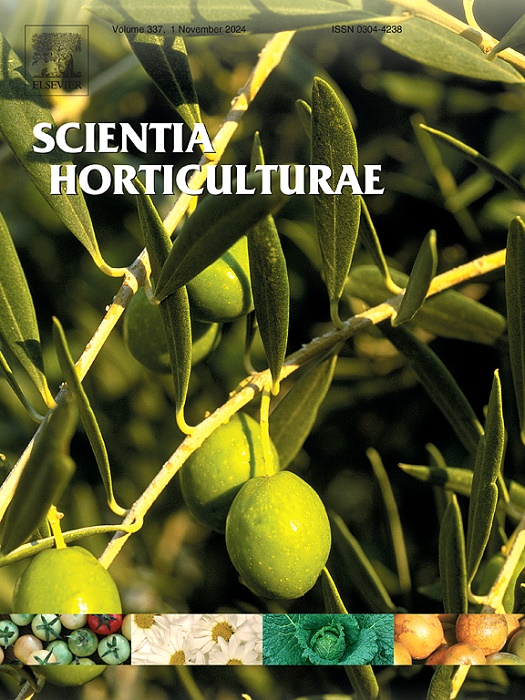生理响应和转录组分析表明,猕猴桃(Actinidia valvata) DJY-C-1对涝渍胁迫的耐受性最强
IF 4.2
2区 农林科学
Q1 HORTICULTURE
引用次数: 0
摘要
涝渍胁迫显著影响猕猴桃的生长和产量。本研究旨在了解猕猴桃耐涝基因型的生理和分子机制,筛选耐涝基因型用于砧木育种。将带塑料袋的植株放入有水的塑料桶中,进行0 ~ 10 d的淹水处理,观察3种基因型的表型变化。形态学结果表明,在涝渍胁迫下,‘Bruno’表现出严重的叶片损伤和根系抑制,‘DJY-C-1’表现出最强的耐受性,‘DJY-B-1’表现出中等的耐受性。进一步分析发现,“布鲁诺”在其根部合成渗透调节物质的能力较弱,抗氧化能力较低。转录组测序分析显示,差异表达基因(DEGs)主要集中在细胞应激、抗氧化防御和蛋白质合成相关的生物过程中。与谷胱甘肽代谢相关的基因在‘DJY-C-1’中表达上调,而在‘Bruno’中表达稳定或下调。本研究成功鉴定出高耐受性基因型“DJY-C-1”,揭示了猕猴桃对涝渍胁迫的响应是通过增强胁迫响应和抗氧化机制,以及调节关键通路基因的表达来实现的。这些研究结果为猕猴桃在涝渍条件下的商业砧木育种和栽培提供了坚实的理论依据。本文章由计算机程序翻译,如有差异,请以英文原文为准。
Physiological response and corresponding transcriptome analysis highlight Actinidia valvata DJY-C-1 with the strongest tolerance to waterlogging stress
Waterlogging stress significantly impacts kiwifruit (Actinidia) growth and productivity. This study aims understand the physiological and molecular mechanism underlying waterlogging tolerance in kiwifruit genotypes to screen waterlogging-tolerant genotypes for rootstocks breeding. Plants with plastic bags were put into plastic bucket with water for 0 to 10 days for the water waterlogging treatments, the phenotypic changes of the three genotypes were observed. The mophological results showed that under waterlogging stress, ‘Bruno’ exhibited severe leaf damage and root inhibition, while ‘DJY-C-1′ showed the strongest tolerance and ‘DJY-B-1′ moderate tolerance.. Further analysis found that the ‘Bruno’ had a weak ability to synthesize osmotic adjustment substances and a low antioxidant capacity in its roots. Transcriptome sequencing analysis showed that differentially expressed genes (DEGs) were mainly concentrated in biological processes related to cellular stress, antioxidant defense, and protein synthesis. The genes related to glutathione metabolism were found to be up-regulated in the ‘DJY-C-1′ but stable or down-regulated in ‘Bruno’. The study successfully identified the highly tolerant genotype ‘DJY-C-1’ and revealed that kiwifruit responded to waterlogging stress by enhancing stress response and antioxidant mechanisms, as well as regulating key pathway gene expression. These findings provide a solid theoretical basis for the commercial breeding rootstocks and cultivation of Actinidia under waterlogging.
求助全文
通过发布文献求助,成功后即可免费获取论文全文。
去求助
来源期刊

Scientia Horticulturae
农林科学-园艺
CiteScore
8.60
自引率
4.70%
发文量
796
审稿时长
47 days
期刊介绍:
Scientia Horticulturae is an international journal publishing research related to horticultural crops. Articles in the journal deal with open or protected production of vegetables, fruits, edible fungi and ornamentals under temperate, subtropical and tropical conditions. Papers in related areas (biochemistry, micropropagation, soil science, plant breeding, plant physiology, phytopathology, etc.) are considered, if they contain information of direct significance to horticulture. Papers on the technical aspects of horticulture (engineering, crop processing, storage, transport etc.) are accepted for publication only if they relate directly to the living product. In the case of plantation crops, those yielding a product that may be used fresh (e.g. tropical vegetables, citrus, bananas, and other fruits) will be considered, while those papers describing the processing of the product (e.g. rubber, tobacco, and quinine) will not. The scope of the journal includes all horticultural crops but does not include speciality crops such as, medicinal crops or forestry crops, such as bamboo. Basic molecular studies without any direct application in horticulture will not be considered for this journal.
 求助内容:
求助内容: 应助结果提醒方式:
应助结果提醒方式:


